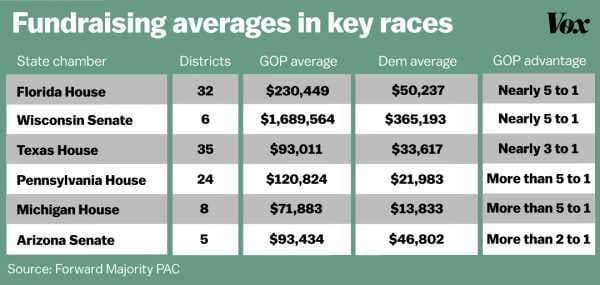
Even with a renewed focus on flipping crucial state legislatures and down-ballot races blue, Democrats are finding themselves outspent by Republicans yet again.
Numbers from the liberal Super PAC Forward Majority obtained exclusively by Vox show that Republicans are out-fundraising Democrats more than five to one in key state legislative races including the Pennsylvania and Michigan Houses. Democratic candidates are also being outspent by nearly five to one in the Florida House and Wisconsin Senate; nearly three to one in the Texas House; and by two to one in the Arizona Senate. (These figures exclude outside spending.)
Republicans control more than two-thirds of the state legislatures in the United States, and Democrats are desperately trying to win back some chambers. Besides trying to make an impact on state policy, 2021 congressional redistricting is weighing heavily on Democrats’ minds; state legislatures have the power to redraw congressional maps every 10 years, and Republicans had the upper hand the last time around.
Even though Democrats are smashing their own fundraising records, they are still falling short of the GOP’s numbers. The Democratic Legislative Campaign Committee (DLCC) has committed to spend $35 million on state races, double what they spent two years ago.
“We’re spending $35 million this cycle to reclaim majorities and the DLCC is poised to flip as many as eight chambers and win hundreds of targeted seats, laying the groundwork to flip even more chambers in 2020 ahead of crucial redistricting efforts,” said DLCC communications director Mara Sloan in a statement to Vox.
Meanwhile, the Republican State Leadership Committee (RSLC) is pouring up to $50 million into state legislative and other down-ballot state races this cycle. The RSLC spent about $38 million each on the 2014 and 2016 midterms, respectively — more than the DLCC is spending in 2018.
The consequences could be huge.
A Republican advantage
Republicans outspending Democrats on state legislative races is nothing new, and the result is clear when you look at a map of state legislatures across the United States and see a sea of red.
“There’s a lot of talk about a Democratic fundraising advantage, and we still clearly haven’t learned our lesson that state legislature elections are going to determine the future of not just our party, but our democracy,” said Ben Wexler-Waite, communications director for Forward Majority, which works to flip state legislatures blue. “We’re very much not seeing that at the state level, which, frankly, two years out from redistricting and 2020, is very concerning.”
Forward Majority has spent $8 million on targeted races in six states since mid-September to make up the gap, and other groups are spending as well. Democrats are running competitive candidates in hundreds of districts, with the hope it will make a difference on November 6. But many of these are first-time candidates, going up against Republican incumbents with financial firepower.
Republican candidates (many of them incumbents) have been raising a lot of money in states like Florida and Pennsylvania in particular — about $8.2 million for Florida House races alone, compared to Democratic candidates raising $2.6 million. Republicans in Pennsylvania, reeling after the state Supreme Court struck down their old congressional maps as a partisan gerrymander, are gearing up for 2018 by raising about $4.1 million, compared to $1.4 million raised by Democrats.

Democrats are focused on key governor races in 2018, but if they don’t have blue-state legislatures to assist them, that could be a major roadblock to redistricting and state policymaking.
Wexler-Waite is blunt about Republicans’ fundraising efforts.
“They’re incredibly effective; they’ve totally outgunned us for years,” he said. “They understand how important these races are.”
And even though there’s plenty of enthusiasm for Democrats in red states at the top of the ticket this year (think Beto O’Rourke in Texas), Wexler-Waite and others are not confident that will trickle down to state races.
“If past years are any indication, we can’t count on people at the top of the ticket to carry us to victory,” he said.
Some are feeling more optimistic about Democrats paying attention to their bench in state races, and are hopeful that some of these statehouse chambers will flip.
“While they may be outspending Democrats, state legislative spending for Democrats has been incredibly strong,” said Carolyn Fiddler, communications director at the liberal blog Daily Kos, which is also fundraising for Democratic candidates. “The energy is there for Democrats.”
Still, there are many arguing that Democrats need to keep building on their strides past 2018 and make state races more of a priority, as Republicans have done.
“This is a 30-year disinvestment,” said Raj Goyle, a former Kansas state representative. “Is there more attention to all levels of government now in the Trump era? Absolutely.” But he added that not prioritizing state legislative races for decades is an institutional problem within the party that can’t be overcome in just 24 months.
Why money is so important in state legislative races
A persistent critique of the Democratic Party over the past few years is it spends the bulk of its energy and money on congressional and presidential races, overlooking state legislatures.
It’s something the DLCC has been trying to correct this year. With the anti-Trump enthusiasm in the United States, state and local races are something engaged people can run for and have a shot at winning.
“Democrats are running the most candidates for state legislatures since 1982,” Sloan said in her statement. “We have more than 5,300 Democrats running, and we’re running twice as many women as Republicans are, and four times as many candidates of color.”
Having competitive candidates in state legislative districts is incredibly important, but candidates also need money to give them the ability to personally engage with voters.
“The ability for candidates to communicate they exist and the freedom for candidates to knock on doors and meet the constituents is game changing in state elections,” said Daniel Squadron, executive director of Future Now Fund, a group is also devoted to flipping statehouse races, including ones in New Hampshire, Maine, Arizona, Michigan, and North Carolina.
As a former New York state senator, Squadron knows the importance of local campaigning and face-to-face contact from local candidates to voters.
“These are legislative districts where if a candidate has a reasonable campaign behind them, they can knock on every door twice,” he said. “The entire battle for control of the chamber costs less than a competitive congressional race.”
Statehouse races have national repercussions
State politics get very little airtime compared to national campaigns for Congress or president, but they’re incredibly important.
Conservatives have been hugely effective in enacting state and local policies on issues ranging from women’s health to gun laws, plus many attempts to pass right-to-work laws targeting unions and bathroom bills barring transgender individuals from using the bathroom that corresponds to their gender identity. Restrictive voter ID bills are also getting a lot of attention in the runup to the 2018 midterms.
Second, many state legislatures draw US congressional maps every 10 years, and Republican legislatures are the root cause of gerrymandered districts in some states.
The US Supreme Court recently ruled North Carolina’s congressional maps unconstitutional and is currently considering maps in Wisconsin, Texas, and Maryland (a Democratic gerrymander). The Pennsylvania Supreme Court recently ruled that the state’s maps were a Republican gerrymander and ordered new ones to be drawn.
But Democrats recognize this fight extends beyond the courts, and many say they need to elect state lawmakers to have a fair shot before the next redistricting after the 2020 census.
“The stakes could not be higher,” said Squadron. “The 2018 state legislative elections will decide who can and cannot vote in 2020, and who controls Congress for a decade.”
Sourse: vox.com






